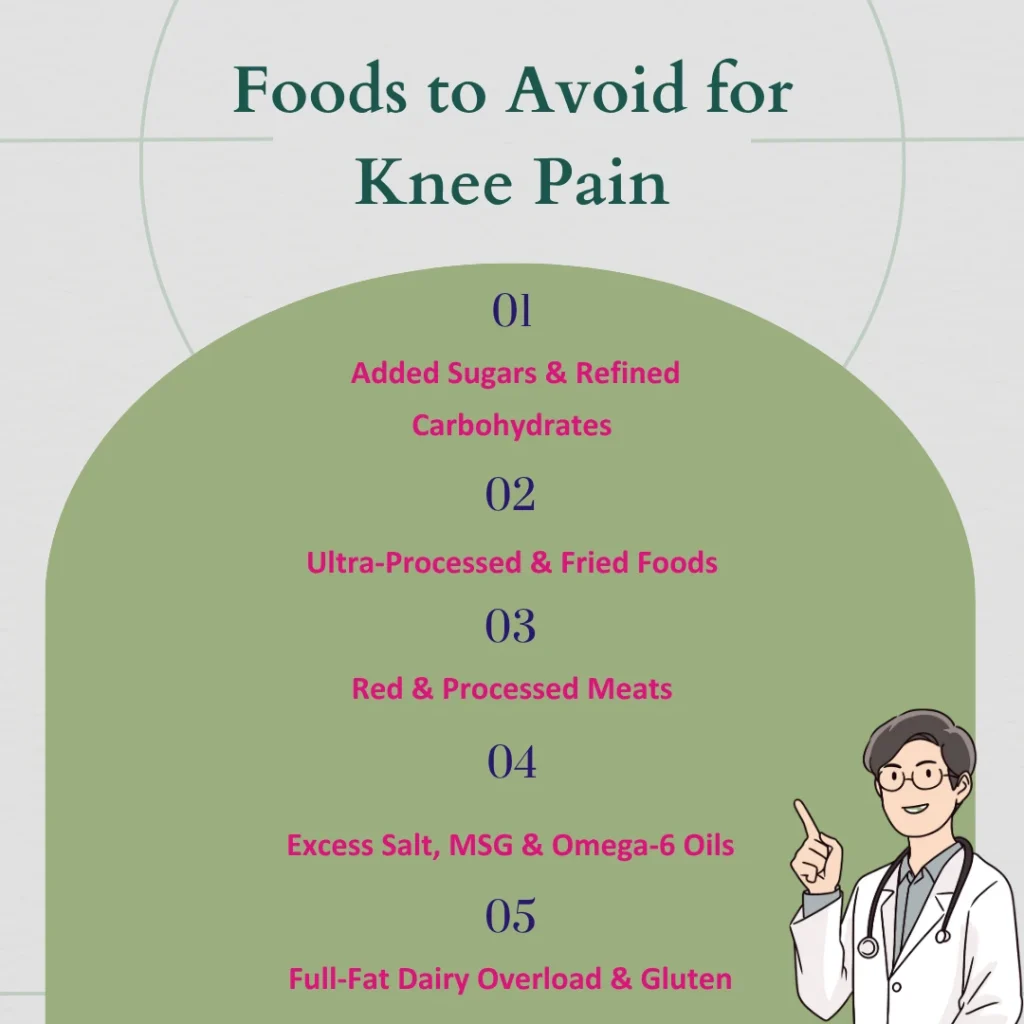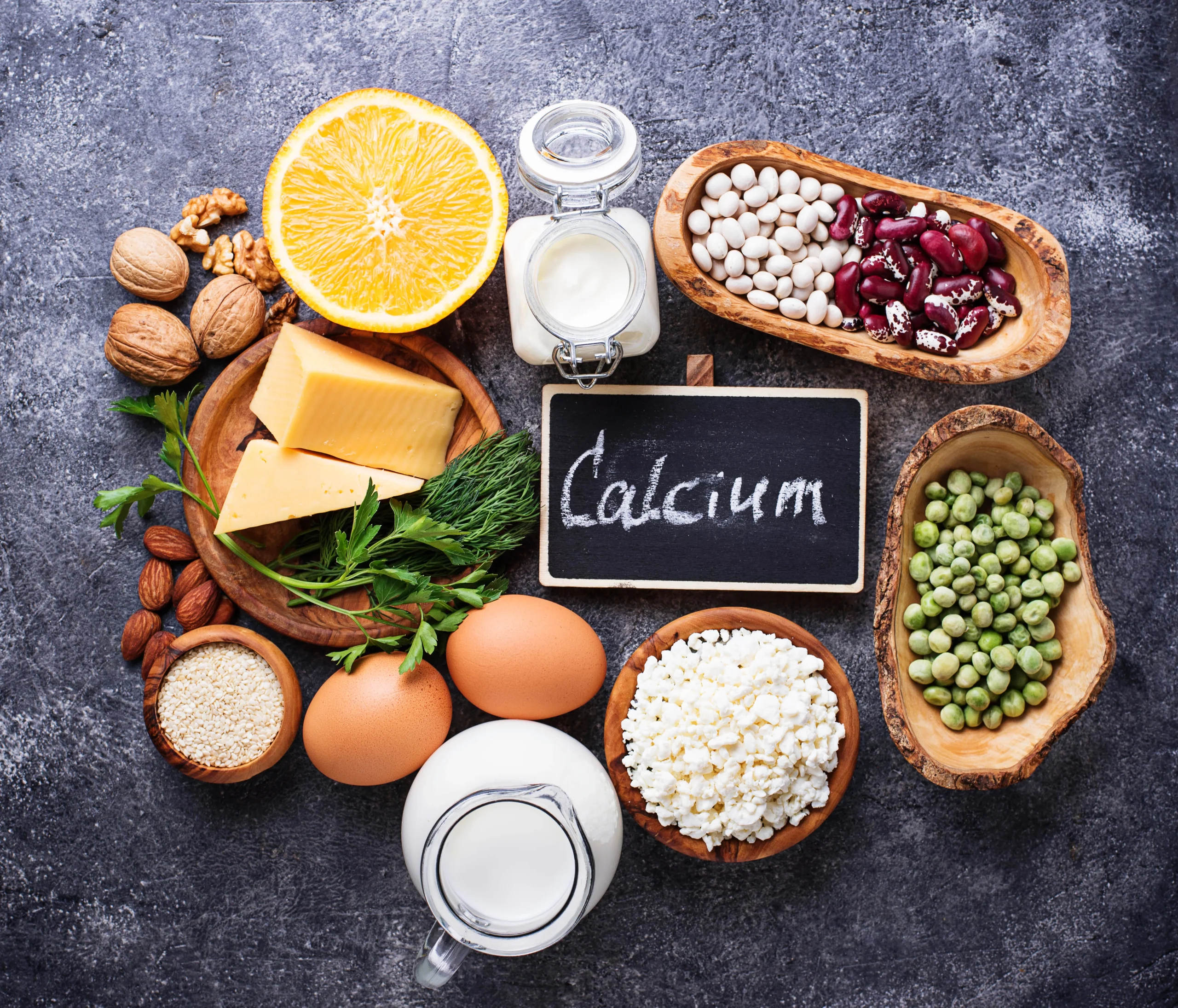Knee pain, whether from osteoarthritis, injury, or inflammation, can significantly hinder quality of life. While medical interventions are essential, research consistently shows that diet plays a crucial role in managing knee pain and improving joint health.
Key dietary goals include:
- Reducing inflammation through anti-inflammatory foods.
- Strengthening bones and cartilage, especially via calcium and vitamin D.
- Maintaining a healthy weight to reduce joint stress.
- Avoiding inflammation-triggering foods that may exacerbate pain.
This guide explores calcium food for knee pain, identifies foods good and bad for knee pain, and offers an actionable anti-inflammatory diet and lifestyle strategy.
Section 1: The Science Behind Diet & Knee Pain
1.1 Inflammation Is at the Core
Knee pain, especially osteoarthritis, is fueled by chronic low-grade inflammation. arthritis.orgwestern-ortho.com. Diets high in sugar, saturated fat, trans fat, and refined carbs promote inflammation, while whole, nutrient-rich foods help control it.
1.2 Calcium and Vitamin D: Strengthening the Framework
Calcium makes up ~60% of bone mass and is vital for strong knees. Vitamin D enhances calcium absorption, especially from dairy and leafy greens, and supports immune balance, reducing inflammation risk
1.3 Omega-3 Fatty Acids: Short-Circuiting Pain Signals
Long-chain omega-3s (EPA and DHA), found in oily fish, are proven to reduce joint pain and improve function in osteoarthritis patients pmc.ncbi.nlm.nih.gov.
Section 2: Calcium Foods That Help Knee Pain
Focusing on calcium food for knee pain isn’t optional; it’s foundational. Here are the best sources:
2.1 Dairy & Fortified Alternatives
- Low-fat milk, cheese, yoghurt: Packed with calcium (approx. 300 mg per cup of milk), vitamin D, protein, and vitamin B12.
- Fortified plant milks: Almond, soy, and oat milks offer similar calcium (350–400 mg per cup), and calcium-fortified tofu provides ~430 mg per 4 oz.
2.2 Leafy Greens & Calcium-Rich Veggies
- Kale, collard greens, broccoli, Brussels sprouts deliver calcium, vitamin K, magnesium, and fibre, all critical for bone density and inflammation control.
2.3 Nuts, Seeds & Legumes
- Almonds (234 mg Ca/100g), white beans (190 mg Ca per cup), chia/flax seeds, and tofu with calcium boost intake.
- These are also rich in magnesium, phosphorus, and protein, supporting bone metabolism.
2.4 Fish with Edible Bones
- Canned salmon and sardines contain soft bones rich in calcium, up to 180 mg in a 3-oz serving. health.harvard.edu+1mayoclinic.org+1.
- Plus, they supply vitamin D and omega-3s, the joint health trifecta.
2.5 Fruits & Vegetables with Supportive Nutrients
- Figs (each contains ~32 mg Ca) and oranges provide calcium, vitamin C (collagen growth), and antioxidants.
Section 3: Anti-Inflammatory Power Foods for Knee Pain
Calcium is vital, but you also need foods to fight inflammation and invigorate joint tissues.
3.1 Fatty Fish (Omega-3s + Vitamin D)
- Salmon, mackerel, sardines, herring, and anchovies deliver EPA/DHA, key to reducing inflammatory cytokines and enhancing pain relief.
3.2 Extra-Virgin Olive Oil
- EVOO provides oleocanthal, an anti-inflammatory compound that mimics ibuprofen’s effects, arthritis.org.au.
3.3 Fruits & Berries
- Blueberries, cherries, and strawberries are high in anthocyanins and vitamin C, reducing inflammation and supporting collagen.
3.4 Herbs & Spices
- Turmeric (curcumin) and ginger have strong anti-inflammatory effects supported by clinical trials.
- Garlic, oregano, green tea, and matcha also reduce swelling and oxidative stress.
3.5 Nuts & Seeds
- Walnuts, almonds and flax/chia seeds provide ALA, calcium, magnesium, and phytochemicals—protecting joint tissues.
3.6 Legumes, Bone Broth & Dark Chocolate
- Beans and lentils supply protein, fibre and anthocyanins—supporting skeletal connective tissues.
- Bone broth provides collagen, glucosamine, chondroitin, and calcium for joint repair.
- Dark chocolate (70% cocoa) offers antioxidants; enjoy moderately for inflammation reduction.
Section 4: Foods to Avoid for Knee Pain
Knowing which foods are not good for knee pain is as important as choosing the right ones.
4.1 Added Sugars & Refined Carbohydrates
- Sodas, sweets, white bread, and pastries spike inflammatory markers and exacerbate pain
4.2 Ultra‑Processed & Fried Foods
- Fast foods, packaged snacks and fried items contain trans fats, excess salt, sugar, additives, and chemicals that worsen joint health
4.3 Red & Processed Meats
- High in saturated fat and inflammatory compounds, linked to worse arthritis outcomes
4.4 Excess Salt, MSG & Omega-6 Oils
- Sodium causes swelling; MSG triggers inflammation. Corn, sunflower oils (omega-6) imbalance, and inflammatory harmony.
4.5 Full‑Fat Dairy Overload & Gluten
- Saturated fats in full-fat dairy can worsen inflammation; gluten or casein sensitivity may aggravate joints.
4.6 Alcohol
- Alcohol increases inflammation, can interfere with medications and triggers arthritis flare-ups.

Section 5: Sample 7‑Day Anti‑Inflammatory & Calcium-Rich Meal Plan
A practical diet for knee pain includes tasty, joint-friendly meals. Here’s a 7-day plan:
| Day | Breakfast | Lunch | Snack | Dinner |
|---|---|---|---|---|
| Mon | A handful of walnuts | Spinach/kale salad + canned salmon + avocado | Fortified oatmeal with figs, almonds, berries, and chia | Stir-fry tofu + broccoli + olive oil + brown rice |
| Tue | Scrambled eggs with kale & tomatoes + whole-grain toast | Lentil soup + fortified plant milk | Orange + almonds | Grilled mackerel + quinoa + Brussels sprouts |
| Wed | Smoothie: yogurt, spinach, banana, flaxseed | Chickpea & quinoa bowl with olive oil | Apple + peanut butter | Bone broth-based vegetable soup + whole-grain bread |
| Thu | Fortified cereal + fortified milk + dried figs | Turkey & avocado wrap + leafy salad | Berries + dark chocolate square | Baked sardines + sweet potato mash + green beans |
| Fri | Almond milk chia pudding with figs + honey | Salmon salad on whole‑grain | Carrots + hummus | Veggie stir-fry + tofu + brown rice |
| Sat | Yoghurt parfait with berries, granola, and flax | Spinach & egg tortilla + side salad | Yoghurt parfait with berries, granola, flax | Grilled chicken breast + kale + olive oil-dressed quinoa |
| Sun | Omelette (spinach, mushroom, pepper) + whole‑grain toast | White bean & vegetable stew | Green tea + dark chocolate | Baked trout + roasted Brussels sprouts + fortified plant milk |
Tips:
- Include daily calcium intake of ~1,000–1,300 mg via dairy, plant milks, greens, fish, and nuts.
- Add omega-3s (fish or chia/flax).
- Use turmeric + black pepper, garlic, and ginger in cooking.
- Use extra-virgin olive oil instead of processed oils.
Section 6: Lifestyle Measures to Boost Knee Health
6.1 Maintain a Healthy Weight
Excess body weight overloads the knee joints. Weight loss reduces pain significantly, especially when combined with anti-inflammatories.
6.2 Exercise Safely
- Low-impact exercises like walking, swimming, cycling, and tai chi strengthen muscles without stressing joints.
- Resistance training with proper form builds supportive muscle and preserves cartilage.
6.3 Mind Your Posture & Joint Mechanics
Good posture and gait, plus supportive footwear, help redistribute load and protect knee structures.
6.4 Supplements (With Caution)
- Vitamin D3: For those low in sun exposure.
- Omega-3 supplements: Beneficial if fish intake is low; evidence supports pain reduction.
- Glucosamine and chondroitin: Mixed research; may help some individuals.
6.5 Stress, Sleep & Recovery
Chronic stress and poor sleep elevate inflammatory markers. Manage stress and get 7–9 hours of quality sleep to support healing.
6.6 Heat/Cold Therapy & Support
Use cold packs during inflammation, and heat packs for stiffness, alongside compression or supportive braces as needed.
Section 8: Takeaways & Final Thoughts
- Include these calcium foods for knee pain: dairy/fortified alternatives, leafy greens, nuts, seeds, legumes, canned fish, figs, and fortified milk.
- Add anti-inflammatory foods: fatty fish, olive oil, berries, turmeric, ginger, garlic, beans, and bone broth.
- Avoid these foods: added sugars, refined carbs, ultra‑processed fried foods, red/processed meats, excess salt, MSG, high omega‑6 oils, alcohol, full-fat dairy (in excess), gluten (if sensitive).
- Combine with healthy habits: weight control, gentle exercise, stress and sleep management, and possibly supplements.
Conclusion
A strategic, nutrient-dense diet for knee pain, optimised for calcium food for knee pain, anti-inflammatory impact, and joint repair, can significantly reduce knee pain, improve mobility, and support long-term joint health.
![]()




